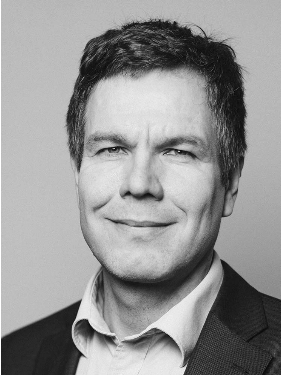“I wouldn't play avoiding and removing emissions off against each other” – atmosfair CEO
Dietrich Brockhagen is founder and CEO of German carbon offsetting project developer atmosfair. Founded in 2005 as a joint initiative of NGO Germanwatch and an association of German travel agencies “forum anders reisen”, atmosfair is supplying both business and private travellers with carbon offsets for their flights or helps entire companies with strategies to reduce their carbon footprint. atmosfair (a non-profit) uses this money to develop renewable energies in developing countries, e.g. wind, solar, biomass energy, and efficient cookstoves. It follows the principle: only compensate emissions that can’t be avoided or reduced.
Clean Energy Wire: How is the market for CO2 offsets developing?
Dietrich Brockhagen: From our point of view, as one of the largest providers in Germany, the market for business offsetting is growing strongly. I expect it to roughly double every two to three years or so. This is because more and more consumers are demanding climate protection from companies. Big companies have realised that reducing their emissions is not enough. Many of our large clients took a few years to find their feet after Paris, and now they have gradually developed climate protection strategies, set their own goals, and then decided to do offsetting as well. For large companies, we are talking about several 100,000 tonnes of compensation every year.
Is the supply big enough for this - i.e. are there enough carbon offset certificates on the market?
I can only speak for atmosfair. We have our own projects, which we manage completely ourselves and with staff on site. And they are scalable. With a certain lead time, we can usually double or triple our capacity quickly. We have a factory for efficient cookstoves in India that produces 4,000 stoves per month and then sells them in southern India. This output can easily be tripled within half a year or so, as long as the money is there. Right now, we are building completely new factories in Nigeria and Ruanda. In Nigeria, we’re looking at producing some 100,000 cookstoves to supply the whole of the south Sahara region. The capacity can reach up to one million stoves per year. So this scaling is possible and there are no limits for us in that sense. In the solar power sector, where we have projects in Kenya and Madagascar, for example, we are also expanding, bringing electricity and mini grids to small cities, but this sort of growth is more difficult and slower. At least this is how it works for us, but there’s still a chance that there might be a shortage of certificates on the market as a whole.
How much does a tonne of compensated CO2 cost?
We have customers who pay up to 100 euro per tonne, because they set an internal CO2 price and regard this as an investment into high-tech and new technologies rather than a compensation. These customers would then also choose very carefully which project they want to fund. On average, one tonne of avoided CO2 costs 23 euros with us but we also have projects in which costs for reducing one tonne are lower. We then use the money that is saved there to fund other, more high-tech and expensive projects. CO2 offset credits in the voluntary market are available for only 1 euro but those are completely rubbish certificates and I don’t believe for a minute that you can compensate a tonne of CO2 with that amount of money.
Info-Box: How the voluntary carbon market (VCM) works
Companies who set themselves net-zero emission targets often find that reducing all of their own emissions is not possible in the short term. To neutralise emissions in their operations, value chain or outside their direct sphere of influence, they therefore make use of carbon offset credits.
The emission offsets are generated by project developers who mostly invest in climate action in developing countries: energy efficient cookers in Nepal and Madagascar, installing wind turbines in India, operating biomass plants in Nigeria or protecting rainforests in Indonesia.
To proof the offset’s quality to customers, many projects use an external quality standard provider which checks the emission reductions achieved and also issues the credits that the project developer can sell.
The voluntary carbon offset market thus describes the generation, selling and buying of the CO2 reductions achieved by project developers and certified by the standards.
To count the emission reduction towards its net-zero goal, a company has to delete the credits it buys to ensure that no further use of the same tonne of reduced CO2 can occur.
Some argue that only afforestation and direct air capture of CO2 with CCS actually represent real carbon removals that can be used to compensate emissions - is that a fundamental problem for the current voluntary carbon offset market which mostly trades avoided tonnes of CO2 rather than removed ones?
This is a theoretical distinction which, in my opinion, does not hold up in practice. In reality, there are only few exclusive afforestation projects. The majority of forest projects are REDD projects, where the existing forest is protected, i.e. not cut down. The offset buyer pays for the local population to be trained not to cut down the forest and has to believe that the forest would not have remained intact otherwise. Only if the forest really grows is it a CO2 removal, but again you can't be sure that the forest will remain alive. Direct air capture is of course the perfect solution in principle. But I wouldn't play avoiding and removing emissions off against each other. They are both part of the spectrum. For the Paris goals, we have to achieve the energy transition as a whole. And that can only happen if we do something like electrify the villages in Madagascar and Nigeria. In such villages, businesses, restaurants, tradespeople have their own diesel generators, and this area is growing. We are financing new solar parks to supply green energy to households and businesses. I don't see it as a contradiction, but complementary. We also need direct air capture (DAC), and atmosfair is also active there, with the first CO2 neutral e-kerosene plant that uses captured CO2.
“If carbon offsetting is only the second-best solution from a climate perspective, even the second-best solution can achieve a lot.”
Is it okay for the clients of offset projects to call themselves climate neutral for avoided tonnes of CO2 in another country that have nothing to do with their own emissions?
At atmosfair, we tell our clients what they can and cannot say when they participate in our projects. They then typically call themselves "CO2 neutral through compensation". This is specified in the contract and some even go so far as to say "on balance CO2 neutral through offsetting". This way it is clear to the customers of these companies that they haven’t reduced their own emissions entirely, but used compensation. If the companies pay money for this to finance the energy transition in the Global South, then that's perfectly fine in my view.
How important is it to you that your corporate clients pursue "avoidance first" and do not achieve their CO2 neutrality on balance, only through offsetting?
Our customers actually have to prove that to us. We check their climate action planning and see if it is ambitious enough, for example by looking at when they want to switch to renewable power consumption, do they use biogas in their cogeneration plants, if they use natural gas, is there a plan to switch to green hydrogen? We reserve the right in the contract to drop out if that is not sufficient. Most suppliers say that every tonne offset is additional and therefore automatically good. Others say that offsetting is perhaps only the second-best solution, but at least a step in the right direction. We say that offsetting can also be a step in the wrong direction if it replaces better measures. But our good position in the market also shows that there are enough large companies who are interested in setting up their own project with us, especially if they offset many 100,000 tonnes a year. And these customers then also have an interest in the fact that the reduction is really additional.
How damaging is the recurring news about duplicitous compensation providers for your business?
Such news is definitely bad for the market and for all of us. This is simply grist to the mill of those who have always criticised that it is a greenwash. It's a real shame when that happens. I can see how much is achieved with our money in the global south. And even if working with offsetting is only the second-best solution from a climate perspective, even the second-best solution can achieve a lot. Companies may still be able to distinguish between good and bad projects, private consumers usually can't. They only hear the bad news when something has gone wrong again. That is bad for us.
"If the meta-standard [by the TSVCM] goes for the lowest common denominator, then the market will not contribute significantly to the greening of energy systems worldwide."
There are standard-setting companies that are supposed to ensure that carbon offsets are reliable and credible. Are they good enough?
They are all too lax. We regularly exceed them and we are actually demanding changes from the standards to account for this, but the standards don't want that, because they also compete with each other. Atmosfair insists, for example, that the subsidy from the offset programme for efficient cookstoves must be at least 50 percent, or rather between 70 and 80 percent, to ensure additionality. Only then can we say 'without us this stove could not have been sold and used'. But there are no such strict additionality requirements in the standards.
The Taskforce on Scaling Voluntary Carbon Markets (TSVCM) launched by banker Mark Carney and other business men, is planning to introduce a new meta-standard - does it make sense for you to join?
We are not involved in that. I have seen this with interest and it is often a good thing when business people try to save the world. I actually have a lot of sympathy for that. But it's simply too much quantity before quality. I don't have the feeling that this will achieve the necessary depth and quality that is needed for the global energy transition. An increase in quantity will not necessarily bring more climate protection. If the meta-standard goes for the lowest common denominator, then the market will not contribute significantly to the greening of energy systems worldwide.
Since all countries under the Paris Agreement have national emissions reduction targets and greenhouse gas inventories, projects that sell CO2 offsets on the voluntary market may lead to double counting, which most stakeholders agree should not be permitted. Does this mean the end of your entire business model?
No, it is not the end. Because we are one of the first to have entered into a so-called corresponding adjustment agreement, in our case with the government of Nepal. That’s the only way that offsetting is still allowed under the Paris Agreement. In the system of national greenhouse gas inventories, every country credits itself for every emission reduction that takes place on its territory. This leads to double counting when a project finances an emission reduction in one country and then sells this emission reduction - which only took place once - to another body, such as a company. The only solution to this is the corresponding adjustment. Nepal has committed to deduct the emission reduction contribution of the atmosfair projects from their balance, because they see that we invest many millions of euros every year in the construction of biogas plants in Nepal. This is the only way that the certificates we spend on these projects can be credited to our customers.



